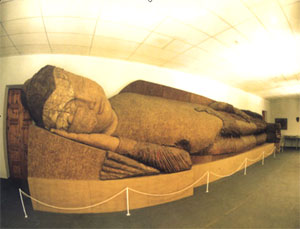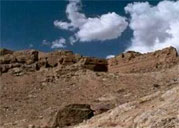

Buddhist monastery |
| Buddhist monastery Adjina-Teppa, V-VIII centuries It is located 12 km to the east of Kurgan-Tube. By plan, the fortress is rectangular, with two parts, including monastery and temple. In temple yard large cruciform mortar was located in the plane of the ornamented facade by steps. The building of monastery was erected from the raw brick and blocks. The building was covered by arches, cupolas and etc. The wall of the temple and halls were decorated by the numerous sculptures of Buddha and bodhisattvas, among which there was 12 m statue of Buddha laying in Nirvana. The walls of the corridor were covered by the miniature paintings, reflecting the sermon of Buddha, surrounded by people and scene of gifters. Researchers: Academic B.A. Litvinsky, T.N. Zeimal (1960-1975). The materials are kept in the fund of Institute of History, Academy of Science Republic of Tajikistan.  Buddhist monastery Vrang, IV-VI-VII centuries It is located on the rock on the left bank of the Vrang Darya River over the Vrang village. It has two stepped mortar, (the third is not saved). At present on the top of mortar there is quadrangular house, which functions as ostana (worship of stone); yard, surrounded by the wall with corner tower. Inside, the premises for servants and monks are located. Arch premises are cut on the slopes and terrace on the opposite bank The monastery is build on Vakhin or Great Buddhist route, which passed via ancient Vakhan after opening Great Silk Route from east to west.
Fortress Kaahka, III-I BC.-VII; X-XI centuries
|
Copyright © 2004-2012 PAMIR TRAVEL
Made by: MabigaTeam

